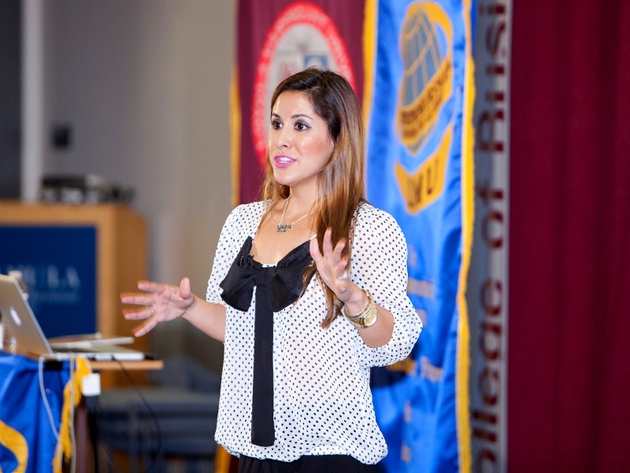Toni Lee Jimenez '03
Toni Lee Jimenez is a 2003 graduate of LMU and founder/publisher of ChicaGirl magazine, the first online magazine for Latina girls. ChicaGirl is a content-driven magazine with real girls as cover models, motivational stories and over $160,000 in scholarship money. She’s worked hard over the past few years building awareness by speaking at local schools and growing the magazine’s online presence. Just last month, she fulfilled another dream of hers by launching a print version of the magazine which is being sold at regional grocery stores in south Texas. Toni hopes to expand her magazine’s reach to other outlets and regions with a high Latina population.
Your LMU degree is not in English or pre-journalism, yet you're an editor. Do you think of yourself mainly as an entrepreneur or as an editor?
An entrepreneur, for sure. I graduated from LMU with a business degree with an emphasis on management and entrepreneurship. I always knew I wanted to start my own business and be my own boss. Not having a journalism background gave me a kind of edge, because I didn't do things in the normal way.
Was your business plan for a magazine?
No, it was for a four-story nightclub. I was inspired by what I saw when I studied abroad in Madrid. The clubs there are so awesome, and I wanted to open one in San Antonio.
When you researched your magazine, were there others you looked to as models?
Latina magazine has been around for perhaps 10 years now, but that's for older women. I was going for a younger demographic. We are in a niche market. There really is nothing for young Latina teens in the magazine market.
How did you introduce the magazine to the target audience?
When I came up the idea, the magazine was called "LaTEENa Girl." I held a preview party, and the next day I got a call from lawyers from Latin Media Ventures, which owns Latina magazine. They sued me for copyright infringement. I ended up countersuing, and I was in a lawsuit for a year and a half. That's when I learned a lot about myself. I was really young and I hadn't even launched the magazine yet, and here I was being sued by one of the top magazines. I knew they picked the wrong girl to mess with, because I stayed in the lawsuit. In the end, the lawsuit was successful. I changed the name of the magazine to Chica Girl, but people knew about Chica Girl even before the magazine launched. The media called it a David vs. Goliath lawsuit. So the suit ended up being a blessing in disguise. It made me stronger. I wasn't going to let them prevent me from following my dreams.
Chica Girl started as an online magazine with no physical edition. Yet you published your first print editing this past January. Why did you go into print?
I didn't have a vision to go into print. I wanted to stay on the digital curve. But I finally listened to my readers, who wanted a printed version. We chose a size of 5 x 7 inches because you can easily throw it in your purse. That's what girls want.
Does publishing print give you more credibility in some people's eyes?
I don't know if it's a matter of credibility, but a lot of people still want to buy magazines and newspapers. They're tangible. People like the idea that you can feel the magazine in your hands. It's interesting: Now that we've gone into print we're getting more supporters.
You don't use professional models on your cover. Why?
My mission is to inspire girls, and I don't want them to feel they have to be professional models to be in the magazine. I'm tired of seeing celebrities on every magazine cover. There are so many positive people in the world, with great stories, so why not highlight them? The girls we put on the cover have to have a motivational or inspirational story that we want to share. It's about highlighting real girls who are making positive choices. I speak to a lot of school groups, from third grade to university level. Early on, I spoke to a group of young girls and brought our covers, and the girls said, "Oh my gosh, that looks like me!" That was exactly what I hoped for.
What part of the project has gone surprisingly well?
Being around for four and a half years, because it was a challenge for people to understand what I was doing by being online only. Now people get it. The economy was really bad when I started, but I've survived and now I'm even going into print.
What do you say to a student who says, "I want to start a magazine, so tell me what I should avoid"?
Avoid doubting yourself. You're going to face challenges. But if you really are passionate about it, don't give up.
Madeline Santy '14
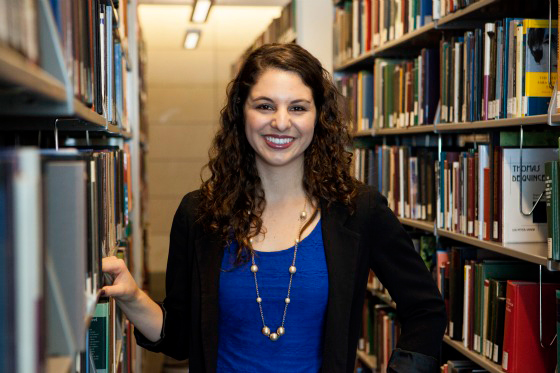
How did this job opportunity come about?
During my junior year, I spoke with a current employee of Deloitte's AERS division who eventually helped me come into contact with the Deloitte recruitment team. I attended a few recruiting events and a two-day leadership conference hosted by Deloitte during the summer between my junior and senior year, and interviewed for a full-time position fall of my senior year.
What activities at LMU helped you get this job?
While at LMU, I worked in the Office of Financial Aid and the Office of Enrollment Management, I was a member of the CBA Student Investment Fund, and I held leadership positions within my sorority. All of these experiences provided me with both technical and core interpersonal skills that I used throughout the interview process and will definitely take with me when I start working full time in the fall.
What is your long-term career goal?
The only goal I have is to make sure that whatever my job is 5, 10, or 15 years from now affords me the ability to maintain a healthy work-life balance, and that I am challenged walking into my workspace everyday.
Why did you decide to major in finance?
When I came to LMU, I knew I wanted to be a business major because I really enjoy the opportunities to build relationships in this field. I also love math and working with numbers, and figured I would combine the two.
Any favorite finance classes at LMU?
All of my finance classes were great, but I really enjoyed the first finance class I took, Introduction to Corporate Finance, with Dr. Offenberg, as well as International Finance with Professor Elkinawy. Both classes offered the opportunity to gain a deeper understanding of core financial topics, while also making it easy to understand what was happening in the financial world outside of the classroom.
Advice for someone who is considering finance as a major?
When I was a finance major, I didn't realize how many paths are available to take after graduation with this degree. Every industry needs finance experts so your opportunities are quite unlimited. My biggest advice would be to talk to your professors about their own career paths, and to gain an understanding about which path suits you best!
Stephen Walden '12, MBA '13
In 2011, Stephen Walden was an undergraduate student at LMU studying theology and business, trying to find a balance of the two. Today, he’s the President and CEO of Bosse Tools, a startup company aimed at revolutionizing the hardware tool industry with ergonomically efficient designs. Suffice it to say, a lot has happened in the last two years.
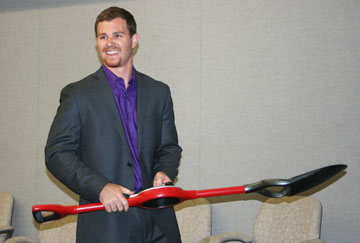
The idea for Bosse Tools originated a few summers ago when Walden found himself exhausted, tired and sore after doing home and garden work. After shoveling for hours on end, he thought to himself “there must be a better way to do this.” With a little creative thought, glue and some PVC pipe, he created the first double-handle shovel that maximizes output and diminishes strain.
Walden took his idea to Professor Fred Kiesner and began working closely with LMU’s Entrepreneurship Program. Soon after, he started taking entrepreneurship courses to learn how to write a business plan, understand financial statements, and launch and manage a new business. He honed his presentation and pitching skills by competing in the New Idea & Elevator Pitch Competition and started traveling to entrepreneurship conferences with the Kiesners. Through the new contacts he made, he was able to get a prototype of his shovel made which has helped the company gain momentum.
It may be too early to say that Bosse Tools is sweeping the nation, but it’s certainly sweeping the collegiate business plan arena around the nation. In March, Walden and teammate Aram Kavoukjian took the idea to the 2013 LeanModel Startup Business Plan Competition at San Diego State University and buried the competition, pun intended. They competed against 16 other schools, including UCLA, USC, Berkeley and Pepperdine, and won the elevator pitch competition, the mock “shark tank” competition, the trade show and the overall grand championship prize worth $12,000. In late April, Walden and Kavoukjian won another $4,000 in the Elevator Pitch Competition at the California Dreamin' Business Plan Competition hosted by Chapman University. They also won an invitation to compete at the 2013 International Business Model Competition at Harvard University in early May.
Professor Kiesner, who has been taking students to competitions for more than 30 years said, “I’ve never heard of any team doing a clean sweep at a business plan competition in all my years with LMU!”
Walden graduated in May with an MBA in finance from LMU and is looking forward to dedicating 100 percent of his time and energy to Bosse Tools. He decided to get his MBA because he always heard having a strong grasp of financials is the key to success. The double-handle shovel was further developed in an entrepreneurship class last year and is currently being refined in the LMU Business Incubator.
“The Incubator keeps me on task because I have to report progress each week,” said Walden. “Dr. Choi encourages weekly progress from each team, so it’s been very motivating. Whichever team can move the quickest is sort of the unspoken success of the week.”
Aside from Walden, other members of the Bosse Tools team include Bryson Ishii (VP of Manufacturing), Aram Kavoukjian (Development Manager) and Andrew Bentley (Technology Manager). Since their big win, the team has made several good contacts and has been approached by potential investors interested in financing the business.
“It’s a special scenario right now where I’m starting a business and, at the same time, I have the best resources around me,” said Walden.
For now, he’s using the prize money to finalize engineering and design work as well as test computer models. The next big expense is buying mold for the tools. In addition to the shovel, Bosse Tools plans to expand its product line to include rakes, pitchforks, brooms, mops, and other tools like edgers and scrapers. Walden is launching a crowdfunding platform via Kickstarter on June 15 to educate as many people as possible about Bosse Tools products and generate pre-sales.
Walden’s parents are both entrepreneurs so some might say that entrepreneurship is in his DNA. Growing up, he witnessed firsthand how flexible and creative a career as an entrepreneur can be. Now he’s experiencing the rewards and hardships for himself, and is looking toward the future with high hopes and big dreams.
“I always knew I wanted to do something different and come up with new ideas,” said Walden. “In fact, I have 10 more ideas in my head right now!”
Letty Cabrera-Calvo EMBA '14
For Letty Cabrera-Calvo ’14, the LMU EMBA Program was truly a life-changing experience. After taking Dr. David Choi’s “New Venture Startup” course, she discovered a newfound passion for entrepreneurship. The knowledge and skills she gained during her time in the EMBA Program motivated her to start her own business and gave her the confidence to build her company and brand.

Letty is the CEO of Vera Mona LLC, an innovative cosmetics company that she founded in December 2013. In less than a year, the company has taken off thanks to a one-of-a-kind cosmetics tool called Color Switch, which became an overnight sensation within the cosmetics industry. Color Switch is a revolutionary product that allows you to quickly change the color on your eye shadow brush without using a liquid cleanser. Color Switch is already being sold in prestigious cosmetics boutiques worldwide and is especially popular in the Middle East.
Letty says the idea for this product came from the frustration of using multiple brushes when applying eye shadow. She did some online research and discovered there wasn’t a product on the market that addressed this problem. In true entrepreneurial form, she seized the opportunity.
After a successful crowdsourcing campaign to raise initial funds, Letty and her husband launched Vera Mona out of their garage, built a website and found vendors to make the product. To get the word out, she sent product samples to bloggers and posted videos on social media. Response was rapid and positive and it wasn’t long before the business took off. Throughout this entire process, Letty has sought advice and guidance from Dr. Choi as well as entrepreneurship students and alumni who have gone through similar experiences.
“I could tell that Letty had the qualities to become a successful entrepreneur,” said Dr. Choi. “She had the passion, the work ethic, the ability to get things done quickly, expertise in her industry, and she was open to experimenting. I am very proud of what she has accomplished in such a short amount of time. There will be ups and downs and bumps in the road, but she has all the qualities to make it.”
With over 15 years of experience in management, business operations and now entrepreneurship, Letty is fully equipped and determined to pursue her business goals within the cosmetics industry. Prior to starting Vera Mona, Letty worked for McMaster-Carr and Verizon Wireless where she gained finance, sales and operations management experience. She also freelanced as a makeup artist which enhanced her expertise in the cosmetics industry.
“The EMBA Program made me even more business savvy,” said Letty, who has a bachelor’s degree in environmental analysis & design from the University of California, Irvine. “Now when I meet with lawyers, accountants and PR firms, I understand what they’re talking about and can have a conversation about all aspects of a business.”
Born and raised in Los Angeles as the oldest of four children, Letty says her biggest cheerleader growing up was her father, Ramon, who always encouraged his children to work hard and take risks. In a surprising twist, the name Vera Mona – which means “true doll” in Spanish – pays a very special tribute to her father. When Letty and her sister came up with the name, they immediately bought the rights to the website URL. It was then they noticed that their father’s name, Ramon, was spelled out inside the word Vera Mona. Letty still gets emotional when she shares this touching story.
Starting a business is not about making money, she says, it’s about liking what you do every day. At the moment, Letty is focused on transitioning Vera Mona into the big leagues. This means moving business operations out of the garage and into a warehouse with manufacturing and shipping capabilities. She’s also working on expanding her product line to include a new eye shadow palette with Color Switch and an arm band for professional makeup artists.
“I want Vera Mona to be a household name,” said Letty. “I really love this brand and believe it has the potential to do very well. I never really had hopes of being an entrepreneur so this whole thing is a bit surreal. So far, it’s been a success story but we have a long road ahead – I’m excited to see where it takes us.”
Kelly Pasek '12
This past summer I interned with the United Nations Environmental Programs (UNEP) Convention on Migratory Species in Bonn, Germany as part of the AIB’s SABINA language + internship program. It was an unforgettable experience and I learned more about Germany, the UN, international business and myself than I ever expected to.
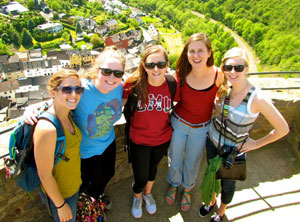
At the core of my experience in Bonn was the AIB. They are the primary reason my time in Germany was so incredible. The AIB staff is very professional, passionate and organized. They meticulously coordinated a number of fantastic outings and excursions throughout my program, including a Rhine cruise, a visit to the chocolate museum in Cologne, wine tastings in the Mosel region and trips to the theatre. Aside from the trips the AIB organized, I was able to go to Paris, Hamburg, Amsterdam, Cologne, Brussels, Frankfurt, Munich, Dusseldorf and Luxembourg during my time in Bonn. The AIB has an amazing network of host families who are incredibly friendly and welcoming. Although I never had any problems with my host family, I knew exactly who to speak with if I ever did. My host family was so kind and helpful that I could not have hoped for a more positive experience.
During my time at the UN, I worked for the Convention on Migratory Species (CMS), which protects any animal species that migrates across international borders. I worked in the Fundraising and Inter-Agency Liaison department. It was a very dynamic and interesting department to work in and it gave me the opportunity to work on different types of projects. My boss and I were essentially in our own department so we worked very closely together. Our two main tasks were to find funding for CMS and to oversee current and potential partnerships. One of my main tasks was researching foundations and charitable organizations globally to find relevant grants for CMS’s partner non-profits who implement CMS’s policies on the ground at the national level. I also did a lot of research into potential partnerships with a variety of organizations ranging from energy companies to major cereal brands to professional sports teams. Toward the end of my internship, I was part of the pre-drafting process for CMS’s new Strategic Plan effective 2014. My work on the Strategic Plan involved reaching out to partner conventions and interviewing those who were responsible for the planning and drafting of their organization’s strategic plan. I then synthesized that information so those involved in the Strategic Plan drafting process had some guidance from experienced hands as they began their drafting process.
Although my boss and I were essentially in our own division, I was able to spend a lot of time with the other interns working at the UN. Everyday I would meet all of the interns for lunch in the lobby. We would go to eat at the various cafeterias in the businesses near the UN like DHL and Deutsche Welle or on sunny days we would eat packed lunches by the river. There were always interns coming and going at the UN and during my two and a half months at the UN I met interns from England, Portugal, Austria, Germany, France, Rwanda, Sierra Leone, Brazil, Belgium, Ghana, the Netherlands and Spain. With such an international group of people we were more different than alike but we quickly discovered the things which connected us were much more important than the things that separated us. By the end of my internship, I had a number of great friends from all over and I know that if I ever end up in their neck of the woods I will have a place to stay.
Living and working in a different country opens your eyes to a different culture and a different way of living. You learn to see your own culture through the eyes of another. When you return to your home country you begin to notice things you never noticed before. Through comparison you understand more fully the things your culture values, what you like about your country and things you wish your country did better.
Jonathan Golad '09
When researching which jobs are in high demand, you’ll almost always find software developer and computer programmer at the top of the list. In fact, studies show that software developers are the fastest growing profession with superb job prospects, low unemployment rates and excellent compensation. CBA alum Jonathan Golad would certainly agree that this is a viable career path.
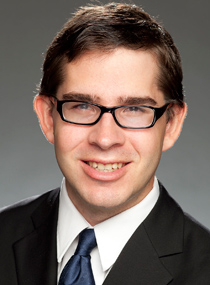
Jonathan currently works as a senior software developer at AltaSense, an AI platform for modern legal departments who want to take control of their data. He previously worked at e-Stet, a litigation technology services provider, where he maintained the firm’s proprietary project management tool, Live.
“I really like the people and technology I work with. My job never feels like a routine and I’m constantly developing new skills,” said Jonathan. “Schedules can be demanding and issues are always arising so it’s important to have good problem solving skills.”
Born and raised in Los Angeles, Jonathan attended Loyola High School where he was introduced to the principles of a Jesuit education. He chose to attend LMU not only because of its Jesuit traditions, but because he liked the location, beautiful campus and intimate feel of the university.
“I knew I wanted to be a business major but it wasn’t until my junior year when I interned at a manufacturing and engineering company that I really became interested in software,” said Jonathan. “I felt like I could really make an impact in this field so I switched my emphasis to AIMS.”
Jonathan has fond memories of his time as a student at LMU. He says Dr. Nakatsu’s “Management Information Systems” class was a highlight of the AIMS program because it covered widespread applications across all fields and taught valuable skills for the workforce. AIMS classes are typically very small so there’s an added bonus of one-on-one attention.
Jonathan graduated from LMU in 2009 with a bachelor’s degree in Business Administration with an emphasis in Information Systems. He was also a member of the University Honors Program and graduated Magna Cum Laude. The new B.S. in AIMS major wasn’t offered while Jonathan was a student at LMU; if it had, he definitely would’ve chosen that major to obtain a better foundation in computer programming.
Instead, Jonathan enhanced his technical knowledge and skills by completing a Master of Science in Information Systems and Technology from Claremont Graduate University in 2012. Looking ahead, Jonathan hopes to one day become a director of software development and oversee an entire team of IT and development specialists. He is very happy with the career path he’s chosen and encourages others with an interest in technology and software to consider the AIMS major.
“My advice to AIMS majors is to keep up-to-date on the latest technology trends, never stop learning and secure a great internship to gain valuable professional experience. This is a hot industry right now and it’s not showing any signs of slowing down. For those interested in this field, it could make for a very rewarding career.”
Roger Davila '12
Roger Davila ’12 knows all too well how difficult life can be. Born in Culver City to Peruvian immigrants, he’s lived in Los Angeles most of his life and has witnessed the same hardships as his family back in Peru. In fact, there was a time in his childhood when he and his family were living out of a car and motels to make ends meet.
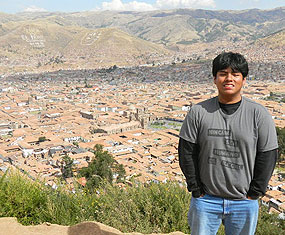
Despite major setbacks, Davila persevered and graduated from LMU in May 2012 with a double major in Business Law and Spanish. He says his life experiences have shaped the person he is today, and are the primary reason why he has such a strong desire to help others.
“I’ve seen my family go through so much in a third world country where people are accustomed to living below standards; I just know life can be better,” says Davila. “I want to show them life outside their conditions and that the world can be a better place.”
During his sophomore year at LMU, Davila got involved in Magis, a male student organization that is built on three essential principles: service, diversity and spirituality.
“Magis played an important part in getting me involved and dedicated to service,” says Davila. “It opened my eyes to what I can do on campus and gave me the opportunity to go overseas.”
Around this time, Davila also got involved in LMU’s Alternative Breaks Program, which promotes service and cultural exchange on the local, national and international level through hands-on, community based learning. Students are immersed in diverse contexts with concrete challenges that heighten social awareness and inspire lifelong social action. Davila participated in his first Alternative Breaks trip in 2010 when he visited East Los Angeles to support urban youth and immigration.
Inspired by his aunt who suffered from polio as a child and is now a paraplegic, he proposed an Alternative Breaks trip to Peru to help children with special needs. During his senior year, Davila’s idea became a reality when 11 students and two staff members traveled to Peru over Spring Break. LMU partnered with Peruvian-based Yancana Huasy, an organization based in Lima that assists people with special conditions and disabilities.
“We spent the majority of our time helping out at therapy sessions like physical therapy, occupational therapy and language therapy,” says Davila. “Transportation for the special needs community is very difficult in Peru so we made house visits to disabled children who couldn’t travel. We also cleaned up classrooms because the school year was about to begin.”
In addition to Magis and Alternative Breaks, Davila was involved in several other LMU student organizations, including the Chicano student movement MEChA and the Service and Action House. He was also active in Students for Labor and Economic Justice, which advocates for worker’s rights and spreads awareness on the injustices that can happen in the workplace.
Now that Davila is a college graduate, he’s got the world at his fingertips. He plans on staying in L.A. with the goal of finding a job that betters the city that he loves.
“I’m really interested in corporate social responsibility so I’m looking into businesses that incorporate CSR into their organizational structure,” says Davila. “And eventually, I’d like to get my MBA in social work.”
One thing’s for certain. No matter what Davila decides to pursue, you can bet he’ll be making a positive difference in the lives of others.
